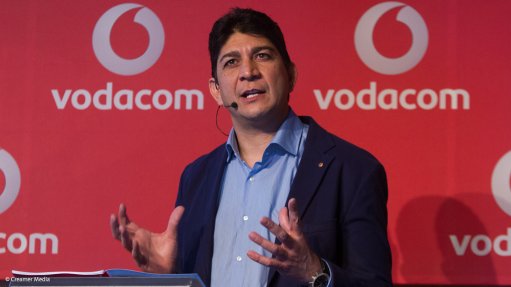
Vodacom CEO Shameel Joosub
Photo by: Duane Daws
JSE-listed Vodacom CEO Shameel Joosub on Monday said the telecommunications group had faced its toughest year yet in the period to March 31; however, the fourth quarter performance indicated an optimistic recovery into the next financial year.
The first half of the year under review had been weighed down by mobile termination rate (MTR) cuts, a weak economic environment, exchange rate volatility and increased price competition, which sent group headline earnings per share (HEPS) into a 4% contraction to 860c, with the MTR cuts shaving 60c.
Group earnings before interest, taxes, depreciation and amortisation (Ebitda) decreased 1.5% to R26-billion, while revenue increased 2.1% to R77-billion and service revenue edged up 0.2% to R62-billion.
Excluding the impact of the 50% MTR reductions, HEPS increased 2.6% and Ebitda was up 3.4%, while revenue increased 4.8% and service revenue rose by 3.4%.
By the second half of the year, Vodacom regained some ground, with a particularly encouraging performance in the fourth quarter of the financial year.
In South Africa, revenue had picked up in the fourth quarter with growth of 4.7%, while service revenue – excluding the MTR impact of R2-billion – grew 1.5%, returning to growth.
The company’s data monetisation and efficiency improved during the final quarter, with data revenue growth of 31% and data traffic growth of 47.5%.
“Solid operational execution [in South Africa] in the second half of the year delivered second-half Ebitda growth of 2.8% with a margin of 37.6%,” Vodacom highlighted.
“The improvement in fourth-quarter performance gives us cause for cautious optimism. The indications are that we have pulled through a transformative period and conditions over the medium term look more favourable,” he told shareholders at a presentation of the company’s financial results in Midrand.
Further, the most significant impact of the MTR cuts were now behind the company and, with a contribution of less than 5% to service revenue, any further cuts in the three-year glide path were not expected to deliver such a large negative impact.
“One is encouraged that if we excluded the MTR cuts, we would have delivered a decent set of results,” Joosub said.
He viewed the period under review as a “rebasing” year as it completed the first 12 months of an accelerated three-year capital expenditure (capex) programme to recapture growth and maintain network leadership.
Vodacom’s capital spend of R13.3-billion during the year, with focus on coverage, capacity and network quality, would bolster Vodacom’s cautiously optimistic outlook.
Capex in South Africa grew 26.1% to R8.6-billion, with another R8-billion set aside for the next year, while international spend increased 18.8% to R4.6-billion.
South Africa’s average revenue per user (Arpu) declined 2.3% year-on-year to R380, and excluding the impact of the MTR cuts, Arpu remained flat.
However, with increased access to better network capabilities, this was expected to change.
As customers shift from second-generation network use to third-generation (3G), Arpu spend would increase by about 10%, while a shift from 3G to fourth-generation (4G) would push Arpu up by 12%.
During the year to March, Vodacom increased the number of 3G sites by 21.4% to 8 802, covering 95.6% of the South African population, while the number of long-term evolution or 4G sites more than doubled to 2 600, covering 34.8% of the population.
Further, Vodacom pointed to the completion of a six-year project to upgrade the radio access network with 4G-ready equipment, with self-provided high-speed transmission extended to 81.3% of the company’s sites.
Meanwhile, Vodacom had “softly launched” fibre-to-the-business (FTTB) and fibre-to-the-home services during the year to March; however, the delay in competition and regulatory approvals for its bid for converged communications network operator Neotel had frustrated the company’s attempt to enter the fixed-line industry.
“The delay in receiving regulatory approval for the acquisition of Neotel is disappointing. This transaction has been with the authorities for approval for almost a year now,” Joosub stated.
The R7-billion tie-up required the approval of the Independent Communications Authority of South Africa and the Competition Commission, both of which were expected by the end of this month, before heading to the Competition Tribunal for a months-long review process.
“Every day of delay is a day lost in connecting South Africa,” Joosub warned.
The more access to FTTB Vodacom had, the more the group could extend its range and effectively compete against the now-stronger Telkom, which had recently concluded its acquisition of Business Connexion.
The buyout of Neotel presented Vodacom an opportunity to capitalise on the currently minimal 7% penetration of fixed-line telecommunications in South Africa and ensure broadband for all by 2020.